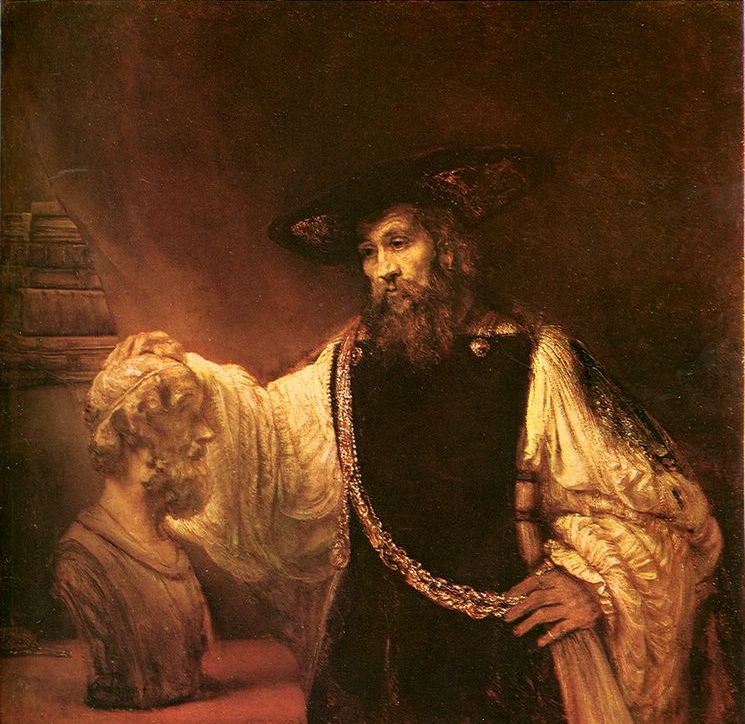On Perspective
 Saturday, April 11, 2015 at 15:45
Saturday, April 11, 2015 at 15:45 One is scarcely encouraged, at least in certain very privileged parts of the world, to voice cacophonous opinions regarding the preeminence of culture. What we do within our country, say that country's pundits, must be given the full respect of those without, especially if the outsiders are obliged to evaluate these details with fractured lenses. And what entails fractured lenses? Consider a country that you have not visited and whose language you know nothing of; consider again what surfaces when you are asked to picture life in that country; consider finally from where these images, words, and nexuses derive. If you were to commit your unabetted reflections to paper and ask coevals whose experiences are similar to do the same, you may be surprised at the uniformity of your answers. You may learn that the Greeks, for example, are thought of as complicating and proud, nostalgic for a past that is so glorious that the centuries of all the countries in Europe combined could not compare, bitter in a way that their recognition as such has been mostly forgotten by ignorance and political convenience. You may learn that Athens will inevitably be described as crowded, hot under skies as blue as the Greek flag, and in ruins like some city-sized outdoor museum replete with the usual slew of street vendors and charlatans. At length you may learn that Greeks tend to speak good English, have a high opinion of themselves that is foolishly interpreted as arrogance, and may not be the most engaging and obsequious when it comes to making your stay comfortable. Since a great deal of Greek blood courses through my veins I can say without fear of perjury that this synopsis, which any Anglophone knowing nothing more about Greece than the names of a few famous writers will unerringly pronounce, is completely true. Why it is completely true and what we should make of such of constellation of detail is what we may loosely term perspective.
 Perspective is almost always right because the masses can look upon their fellow man and sense things that escape the most specialized of laboratorians. When there is a tendency to be shallow, vain, or harmlessly overweening, such a tendency does not elude the watchful eyes of the rabble. It is this same rabble, in fact, who diagnose a situation most accurately because they look to the core of the matter and espy what they have always been told exists, and the kernel of truth in such platitudes is the kernel that pops when we agitate the bag. Take a band of Anglophones in Greece accumulating the impressions mentioned above: a Greek nationalist or an immigrant who typically overidentifies with his forefathers and fights battles that neither they nor he could ever win might be quick to denounce these remarks. How could anyone say anything negative about the society that bestowed upon us democracy, classical art, and philosophy? Do we not owe Greeks the entirety of our civilization? We do very much so, and it is regrettable how insouciantly their legacy is treated by the modern mind, entranced as it is by its own age and accomplishments. Yet what Greece holds (and does not hold) for the modern mind does not surprise me, because what is missing between Greece, its riches, lore, and ingenuity, is approximately two thousand years of equalization. In a curious way Greece remains our illustrious ancestor whose achievements will always surpass our own. And as is habitual among heirs, some will look upon this fact with unending awe, while others will only resent that they did not come first.
Perspective is almost always right because the masses can look upon their fellow man and sense things that escape the most specialized of laboratorians. When there is a tendency to be shallow, vain, or harmlessly overweening, such a tendency does not elude the watchful eyes of the rabble. It is this same rabble, in fact, who diagnose a situation most accurately because they look to the core of the matter and espy what they have always been told exists, and the kernel of truth in such platitudes is the kernel that pops when we agitate the bag. Take a band of Anglophones in Greece accumulating the impressions mentioned above: a Greek nationalist or an immigrant who typically overidentifies with his forefathers and fights battles that neither they nor he could ever win might be quick to denounce these remarks. How could anyone say anything negative about the society that bestowed upon us democracy, classical art, and philosophy? Do we not owe Greeks the entirety of our civilization? We do very much so, and it is regrettable how insouciantly their legacy is treated by the modern mind, entranced as it is by its own age and accomplishments. Yet what Greece holds (and does not hold) for the modern mind does not surprise me, because what is missing between Greece, its riches, lore, and ingenuity, is approximately two thousand years of equalization. In a curious way Greece remains our illustrious ancestor whose achievements will always surpass our own. And as is habitual among heirs, some will look upon this fact with unending awe, while others will only resent that they did not come first.
This is why those of us who believe in the moral goodness of our world, in its inherent virtue, in man's innate desire to love, be loved, and help the weak and poor, will be able to discern the truth about many places and times, including Greece. Ask an antiquarian about Hellenic civilization and he might show you some fine pottery; ask a classicist and he might recite a poem by this poet; ask a Russian or a Serb and you might be surprised at the chauvinism in favor of their Orthodox brethren. As it were, the truth about Greece lies not the uniformity of superficial observations but in their interlinkage. I may tend to look back upon what occurred two thousand years ago (and well before) with a sentimentally teary eye because my heritage has raised me to understand what the Greeks did as not only significant, but also eternal. I may sneer at people who think that civilizations whose apogees lie in the distant past do not deserve much consideration since we all must confront the here and now. And I may be particularly hasty to justify and defend any odd practices – there were quite a few – of these same Hellenes because their means led to distinctly remarkable ends. I am right and wrong about all these points; where I am right is obvious; where I am wrong will also depend on perspective.
Despite recent claims by science and its peremptory minions, perspective on the sun and moon is relative only insofar as we understand ourselves to be glued to a planet that tilts in an endless universe, rendering our small sphere nothing more than a period in a thousand-page novel. We are moving, sure enough, but is your sun or your moon really relative? What to the untrained eye, or better phrased, to the naked eye, really seems to be relative? You may listen to scientists all you want (they certainly like to hear themselves talk), but what does your soul and mind or their collaboration tell you about the stars and sky? Do you ever stop to think whether someone is seeing things the exact way that you see them, an old Romantic convention, or do you really believe that we all see them differently? Are we hoodwinked by our dullness into believing that every moment of every day things are just a bit different to every single person at every single place on earth and that, therefore, there can be no true coincidence of visions? Perhaps a militant astronomer will argue this point and he will end up sitting alone at the end of a long banquet table. But what holds this planet together is something very different, which we may, for lack of a better word, also call perspective.
It has been said that literature, to avoid becoming an arcane cult of a mandarin class, needs to impose its values. And what are its values? Its values may be debated at that same banquet table – but on the other end well out of earshot of the astronomer – yet they involve two persons: the writer of genius and the ideal reader. By definition, one supposes, these cannot be one and the same person. A novelist may compose the perfect story about two lovers, one of whom may be loosely based on himself, the other on the woman whom he will never really forget. He may indicate the details of their palavers, plan their meals and ablutions, temper their attitudes toward the commonality of their relationship, sever bonds with certain salubrious habits to make them more brazen, and grant them a vocabulary that would indicate a higher level of intuition. They will laugh, play, love, sizzle, wince, claw, and break their days into sections that can be analyzed and understood and he will name them as chapters or pages or sentences. They will push their ideas into words and shapes that will dwell within our own words and shapes of our own palavers and meals and ablutions, and we will nod and understand their syntax. And finally – and, some would say, most regrettably – a judgment will have to be pronounced. Is this eternal love or another tale of romance and release? In other words, they will decide either to remain in this connection because fate and desire have willed it thus, or cease to operate in tandem, two branches broken from the same tree or even two flowers who permit intervening weeds to block their closeness. In other words, they will or will not be each other's ideal readers.
That is the choice we face. We may assume the world to be complex and unfathomable in most respects, but we may also choose to understand what part of our world an open mind may perceive as bearing upon his own destiny. The starry sky above us is ours as much as the filth we crush with our jackboots; both of these extremes should frame our reference and our spirit. When you ask me what is a human being, I would respond it is the one living thing on this planet that can relate to both the highest and lowest strata of space and time. Our world in its various and sundry parts is synthesized by one gaze in which we are expected to predict danger, love, fear, ecstasy, and sadness. Classical Greece stretches into Modern Greece as if the Ancients were still speaking through their scions, and yet we perceive the continuum in their profile, their manner, the occasional verb that has been used in the same way for five thousand years. Our perspective is the sum of all mirrors and angles that reflect a unity and solace that cannot be denied, and in its wake we espy, each of us who spends some time to observe rather than project, a clarity that suggests a long tale in a language we might understand at times regarding the matrimony of fate and desire. In fact, we might even go so far as to claim that as life progresses, fate and desire can no longer be distinguished. That last assertion is for the privileged who can choose their fate, their reading, their books, and their perspective. And when they actually look at the world and see only love and hope, then it is we who have become its ideal reader.

